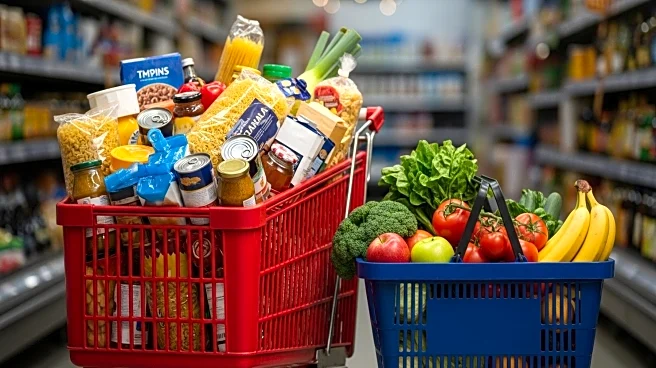What is the story about?
What's Happening?
In the lead-up to Christmas, a significant price war is unfolding among UK supermarkets, with Asda and Lidl announcing substantial price reductions to attract budget-conscious consumers. Asda has reduced prices on 956 grocery items both in-store and online, reintroducing its Rollback scheme to offer competitive pricing. This move is part of Asda's strategy to support families facing rising living costs. Meanwhile, Lidl has committed £250 million to cut prices on over 1,000 everyday items, emphasizing its mission to provide affordable, healthy food. Lidl's loyalty scheme, Lidl Plus, offers additional savings through weekly coupons and rewards. Despite these aggressive pricing strategies, Tesco, the UK's largest supermarket chain, continues to grow its market share, reaching 28.4%, up 0.8 percentage points year-on-year. Tesco's success is attributed to its price-matching strategies, investment in own-brand and premium ranges, and digital transformation efforts.
Why It's Important?
The supermarket price war highlights the intense competition among retailers to capture consumer loyalty during a period of economic uncertainty. With food inflation expected to peak at 5.7-6% in December, supermarkets are under pressure to balance competitive pricing with maintaining profit margins. Asda and Lidl's price cuts aim to attract cost-conscious shoppers, but they also risk supplier pushback due to reduced profit margins. Tesco's continued market share growth demonstrates the effectiveness of its balanced approach, combining competitive pricing with brand strength and digital innovation. The outcome of this price war could significantly impact the retail landscape, influencing consumer shopping habits and retailer strategies in the long term.
What's Next?
As the festive season approaches, supermarkets will continue to vie for consumer loyalty through pricing strategies and promotional offers. The outcome of Asda's supplier conference, where it seeks to negotiate further price reductions, will be crucial in determining its competitive position. Retailers will need to navigate the challenges of rising food inflation and supplier pressures while striving to meet consumer demand for affordable products. The success of these strategies will likely shape the competitive dynamics of the UK supermarket industry in the coming months.
Beyond the Headlines
The ongoing price war among supermarkets raises questions about the sustainability of deep discounting strategies in the face of rising costs. Retailers must consider the long-term implications of eroding profit margins and the potential impact on supplier relationships. Additionally, the focus on affordability and value may drive further innovation in private label offerings and digital engagement to enhance customer loyalty. The evolving retail landscape will require supermarkets to adapt to changing consumer preferences and economic conditions.















